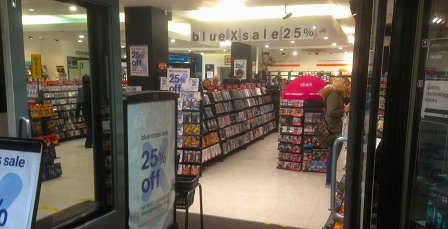Erstellt am: 17. 1. 2013 - 12:55 Uhr
His Muzzled Voice
Für die deutsche Version hier klicken
It has become an automatic reflex. Whenever some part of the old music industry hits the wall, everyone who likes to sound smart without bothering to think will claim that said company adapted too slowly to the changed circumstances of the internet age.
On Tuesday afternoon the formerly powerful empire HMV, this country's last surviving music and DVD chain, founded back in the 1920s, passed its 239 shops into the hands of the administrators.
By the same morning I got a press release with the headline: “HMV's slow digital response to blame - Musicmetric chief.”
By its description attached to the press release, this company begging for attention with its lightning-quick analysis seems to be the brainchild of a bunch of statisticians whose idea of glamour is a career in supplying the remainder of the music industry with anonymous data about music consumed via torrent.
Musicmetric even have their own proper CEO Gregory Mead, who, among the usual stuff about seismic shifts and lost chances, offered the most dubious conclusion of the day: “Where retailers like John Lewis have embraced the internet” (...derderder, seismic shifts, failure to adapt...) “you’d be hard pressed to be able to walk into an HMV store and buy songs directly on to your iPod.”
In other words: Because there are people who order their double bed from a website to be delivered to their door, according to this professional scanner of global download behaviour, there should also be “music fans” who would pop down to a shop to collect a sound file if only HMV had let them.
I'm only mentioning this mad idea as an example for the tiring smugness of those apologists of anything web-related who, with Friedmanite fatalism, like to project some form of higher justice or cultural progress into whatever the markets might legally or illegally get up to.

Robert Rotifer
One blog that was widely and uncritically circulated on the day of HMV's collapse came from a marketing executive called Philip Beeching whose company worked for HMV for 25 years. Beeching entertainingly charts the excesses of the nineties, when the chain was pampered by the high profit margins of CD sales before relating how he and the business partner in his marketing firm had realised, even at the dawn of the millennium, that the winds of fate were about to change.
But on telling the HMV boardroom that the true competition would be supermarkets, downloads and the online market, the boss of the company reacted angrily, declaring he had never heard “such rubbish”. Supermarkets were not an option for the “serious music, games or film buyer” and downloads “just a fad”.
Beeching describes feeling “decidedly winded” at the pub later on, as well as his surprise at the subsequent renewal of his contract with HMV.
Hold on, I thought as I read this: Doesn't this mean that you, the far-seeing author, are partly to blame for the demise of the retailer yourself? Or was all your work in all those years for nothing?

Robert Rotifer
After all, in that Golden Era when everything went wrong according to Beeching (whose former blog about the book seller Waterstone's seems spot on in telling a completely different story, by the way), the HMV stores had a clear, unsentimentally valuable reason to exist: Endless shelves of records, a near full catalogue of practically all the reissues, a touchable, cleanly ordered encyclopedia of pop, plus well-stocked departments for jazz, folk, “world”, soul, blues, country, old rock'n'roll or classical music, as well as plenty of specialist magazines and music books.
This was the kind of open invitation to broaden your horizon that customers wouldn't find on iTunes or amazon where what is sold as a widening of choice is in fact a deepening of one's own tunnel vision („customers who bought this item also bought...“).
It was an invaluable function that independent niche retailers could not and would not even want to fulfil. While the megastore lacked their personality, its uncurated pragmatic generalism also exuded a refreshing lack of prejudgement.
As wide as the palate of, say, Rough Trade East might be, it will never satisfy the temptation to go down to the basement for a bit of Bach after feasting on a smorgasbord of pop on the ground floor.
In 2004 I moved to Canterbury where I found a local HMV that at least made an effort to live up to its Oxford Street equivalent's example (back then still competing with Virgin's and the independent Richard's Records, both long gone).
But soon the shop underwent some radical revamps with a sprawling DVD department an ever-growing niche for games and the advent of the “technology” department which mainly sold accessories for listening to music without the need for records (see also Bob Stanley's excellent blog on the subject).
Like so many others I went round to my local HMV again on Tuesday to buy something in its “blue cross sale” before it goes. But there was nothing that I couldn't have found on the CD, DVD and book racks of any larger supermarket. The books section consisted mostly of 50 Shades and its spin-offs next to a few token pop biogs, while in the CD department there was nothing but recent chart fodder and an utterly arbitrary choice of mainstream reissues.
After a few minutes I gave up. In this record shop that feels ashamed about being one, there was absolutely nothing for a “serious music and film buyer” like myself (admit I don't know about games).
Of course, the demise of HMV has its roots in the misery of the British high street hit by consumers' drastically lowered buying power after the bursting of the credit card bubble. In the last ten years the cost of living has risen by 43% while real income has steadily gone down.
And it's true that even bigger damage was caused by the competition from Amazon who can afford to be cheaper as they don't pay their corporation tax in the UK. But in the end nothing can deflect from the fact that HMV lasted much longer than its competition, be it Our Price, Borders, Virgin/Zavvi or Tower Records.
Were all of them just even more backwards-looking, hubristic and useless than the seemingly backwards-looking, hubristic and useless HMV chain?
According to Philip Beeching and the columnist consensus, HMV could have been way ahead of the pack in the download business. But let's refresh our memories of the correct sequence of events:
First there was unbridled illegal file sharing, then came legalisation through iTunes. But Apple delivered music in order to sell us its hardware. The sale of mp3s on their own would not have been a profitable business model for them either.
Doubtless the established brand HMV could have and can still be used for digital distribution, but this would never have justified keeping 239 shops and 4000 employees. Those who now talk of a missed digital future for HMV would not have saved much more than its name.
Indeed, the more I think about it, the more I suspect that Beeching's boss might have actually been pretty much correct in the first part of his assessment. The cardinal failure then was not to heed it, but instead to leave the “serious music buyer” out in the rain.
A retailer who does not know the value of their own product cannot convince a customer. Naturally, some poxy download, let alone a torrent or a stream will not deliver the same quality as a record, but HMV chose not to serve the people who recognise this.
I'll never know if my local HMV could have made something out of its monopoly as the last high street record retailer, especially in the light of growing vinyl sales. They never even tried to take on that role.

Robert Rotifer
The logic of a pastry shop that sells fewer croissants might be to order less of them in. But records don't work like that. They might be sold in smaller numbers, but at the same time more and more different products are released. Furthermore, 2012 was the year when reissue sales first overtook sales of new music. This means that there is an extremely varied present as well as sixty years of pop history to represent, aside from a world of other genres.
The only logical reaction to this change, that is propelled by pop's rampant retromania on one hand and lower production costs on the other, would have been to widen the catalogue, something that only HMV with its wealth of shop space was in a position to do. Instead they chose to go the other way, making the shop unusable.
This, not a venture into the online market, may well have been the real missed chance.
Please share your thoughts and comments for this story underneath the German version.

